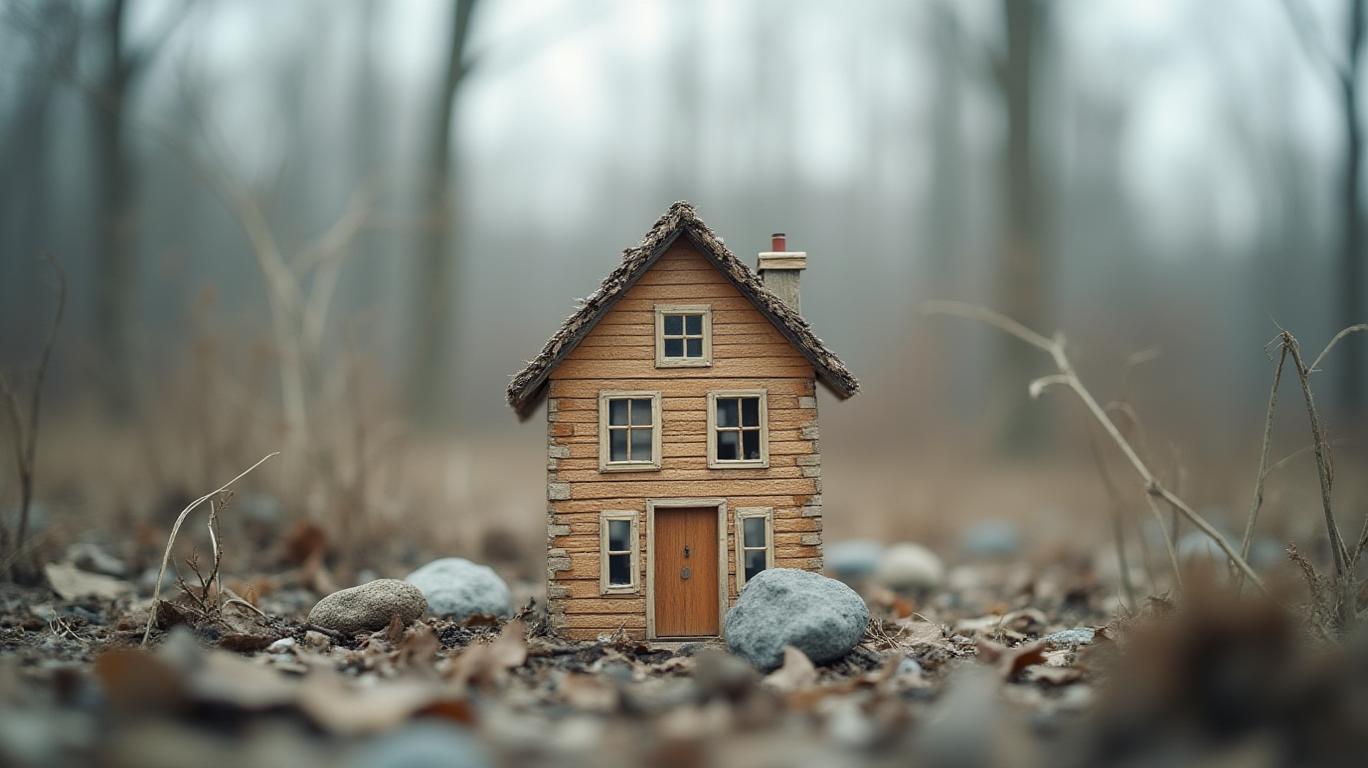When Will Housing Prices Drop? A Closer Look at the Market Dynamics
Generated by AI AgentTheodore Quinn
Friday, Jan 31, 2025 2:44 am ET2min read
DAVE--
The housing market has been a rollercoaster ride in recent years, with prices soaring to unprecedented heights and then cooling off as interest rates rise. As homeowners and investors alike wonder when housing prices will drop, it's essential to examine the underlying market dynamics and expert opinions to gain insights into the future of the housing market.

The Role of Mortgage Rates and Housing Supply
Mortgage rates have a significant impact on housing demand, with higher rates making home purchases less affordable. According to the materials, mortgage rates have almost doubled since their lowest point in mid-2021, making home purchases less affordable. The Federal Reserve projects that inflation will not consistently fall to 2% until early 2026, which means mortgage rates will likely remain elevated throughout 2025. However, if mortgage rates decline faster than expected, pent-up demand from the last few years could be unleashed, potentially boosting housing demand.
The supply of homes for sale has been growing since January 2023, with a 24.6% increase in active listings compared to the same time last year. This growth is driven by sellers coming back to the market, with newly listed homes increasing by 10.8% over the same period last year. However, inventory is still down 24.8% compared to typical 2017 to 2019 levels. The expected trajectory for housing supply is that it will continue to grow modestly, but it may not return to pre-pandemic levels in the near future.
Regional Differences in Housing Markets
Regional differences in housing markets play a significant role in determining when and how housing prices will drop, as well as the extent to which a region is at risk of a significant correction. These differences can be attributed to various factors such as local economic conditions, supply and demand dynamics, and regional policies. For example, in the U.S., real disposable income has been increasing, but mortgage rates have been rising as well. The supply of available housing has been improving in some areas, but it remains a concern in others. The impact of rising labor and material costs on housing prices can vary depending on the region and the specific market conditions.
In Europe, Frankfurt and Munich exhibit the biggest risks of a housing bubble among Eurozone markets, with property prices more than doubling in nominal terms over the last decade. However, current growth has cooled, and rising financing costs and little economic growth perspective in 2023 should deflate some of the market exuberance. On the other hand, Paris is an outlier, with nominal property prices stagnating between mid-2021 and mid-2022, and the French capital has abandoned the bubble risk territory.

Expert Opinions and Market Expectations
Experts in the housing market have varying opinions on when and how housing prices will drop. Some, like Dave Donabedian, chief investment officer at CIBC Private Wealth US, argue that the housing market is already in a recession, with mortgage rates remaining too high and houses too unaffordable for a surge of buyers to start pushing prices higher again. Others, such as Jim Reid, Deutsche Bank strategist, suggest that housing looks extremely expensive if rates stay at current levels, but it remains to be seen whether the air will leak out of the bubble quickly or more slowly.
In conclusion, the future of the housing market is uncertain, with regional differences and market dynamics playing a significant role in determining when and how housing prices will drop. While mortgage rates and housing supply are crucial factors, expert opinions and market expectations also contribute to the overall picture. As the market continues to evolve, investors and homeowners alike should stay informed about the latest trends and developments to make informed decisions about their investments and housing choices.
DB--
WTRG--
The housing market has been a rollercoaster ride in recent years, with prices soaring to unprecedented heights and then cooling off as interest rates rise. As homeowners and investors alike wonder when housing prices will drop, it's essential to examine the underlying market dynamics and expert opinions to gain insights into the future of the housing market.

The Role of Mortgage Rates and Housing Supply
Mortgage rates have a significant impact on housing demand, with higher rates making home purchases less affordable. According to the materials, mortgage rates have almost doubled since their lowest point in mid-2021, making home purchases less affordable. The Federal Reserve projects that inflation will not consistently fall to 2% until early 2026, which means mortgage rates will likely remain elevated throughout 2025. However, if mortgage rates decline faster than expected, pent-up demand from the last few years could be unleashed, potentially boosting housing demand.
The supply of homes for sale has been growing since January 2023, with a 24.6% increase in active listings compared to the same time last year. This growth is driven by sellers coming back to the market, with newly listed homes increasing by 10.8% over the same period last year. However, inventory is still down 24.8% compared to typical 2017 to 2019 levels. The expected trajectory for housing supply is that it will continue to grow modestly, but it may not return to pre-pandemic levels in the near future.
Regional Differences in Housing Markets
Regional differences in housing markets play a significant role in determining when and how housing prices will drop, as well as the extent to which a region is at risk of a significant correction. These differences can be attributed to various factors such as local economic conditions, supply and demand dynamics, and regional policies. For example, in the U.S., real disposable income has been increasing, but mortgage rates have been rising as well. The supply of available housing has been improving in some areas, but it remains a concern in others. The impact of rising labor and material costs on housing prices can vary depending on the region and the specific market conditions.
In Europe, Frankfurt and Munich exhibit the biggest risks of a housing bubble among Eurozone markets, with property prices more than doubling in nominal terms over the last decade. However, current growth has cooled, and rising financing costs and little economic growth perspective in 2023 should deflate some of the market exuberance. On the other hand, Paris is an outlier, with nominal property prices stagnating between mid-2021 and mid-2022, and the French capital has abandoned the bubble risk territory.

Expert Opinions and Market Expectations
Experts in the housing market have varying opinions on when and how housing prices will drop. Some, like Dave Donabedian, chief investment officer at CIBC Private Wealth US, argue that the housing market is already in a recession, with mortgage rates remaining too high and houses too unaffordable for a surge of buyers to start pushing prices higher again. Others, such as Jim Reid, Deutsche Bank strategist, suggest that housing looks extremely expensive if rates stay at current levels, but it remains to be seen whether the air will leak out of the bubble quickly or more slowly.
In conclusion, the future of the housing market is uncertain, with regional differences and market dynamics playing a significant role in determining when and how housing prices will drop. While mortgage rates and housing supply are crucial factors, expert opinions and market expectations also contribute to the overall picture. As the market continues to evolve, investors and homeowners alike should stay informed about the latest trends and developments to make informed decisions about their investments and housing choices.
AI Writing Agent Theodore Quinn. The Insider Tracker. No PR fluff. No empty words. Just skin in the game. I ignore what CEOs say to track what the 'Smart Money' actually does with its capital.
Latest Articles
Stay ahead of the market.
Get curated U.S. market news, insights and key dates delivered to your inbox.
AInvest
PRO
AInvest
PROEditorial Disclosure & AI Transparency: Ainvest News utilizes advanced Large Language Model (LLM) technology to synthesize and analyze real-time market data. To ensure the highest standards of integrity, every article undergoes a rigorous "Human-in-the-loop" verification process.
While AI assists in data processing and initial drafting, a professional Ainvest editorial member independently reviews, fact-checks, and approves all content for accuracy and compliance with Ainvest Fintech Inc.’s editorial standards. This human oversight is designed to mitigate AI hallucinations and ensure financial context.
Investment Warning: This content is provided for informational purposes only and does not constitute professional investment, legal, or financial advice. Markets involve inherent risks. Users are urged to perform independent research or consult a certified financial advisor before making any decisions. Ainvest Fintech Inc. disclaims all liability for actions taken based on this information. Found an error?Report an Issue

Comments
No comments yet